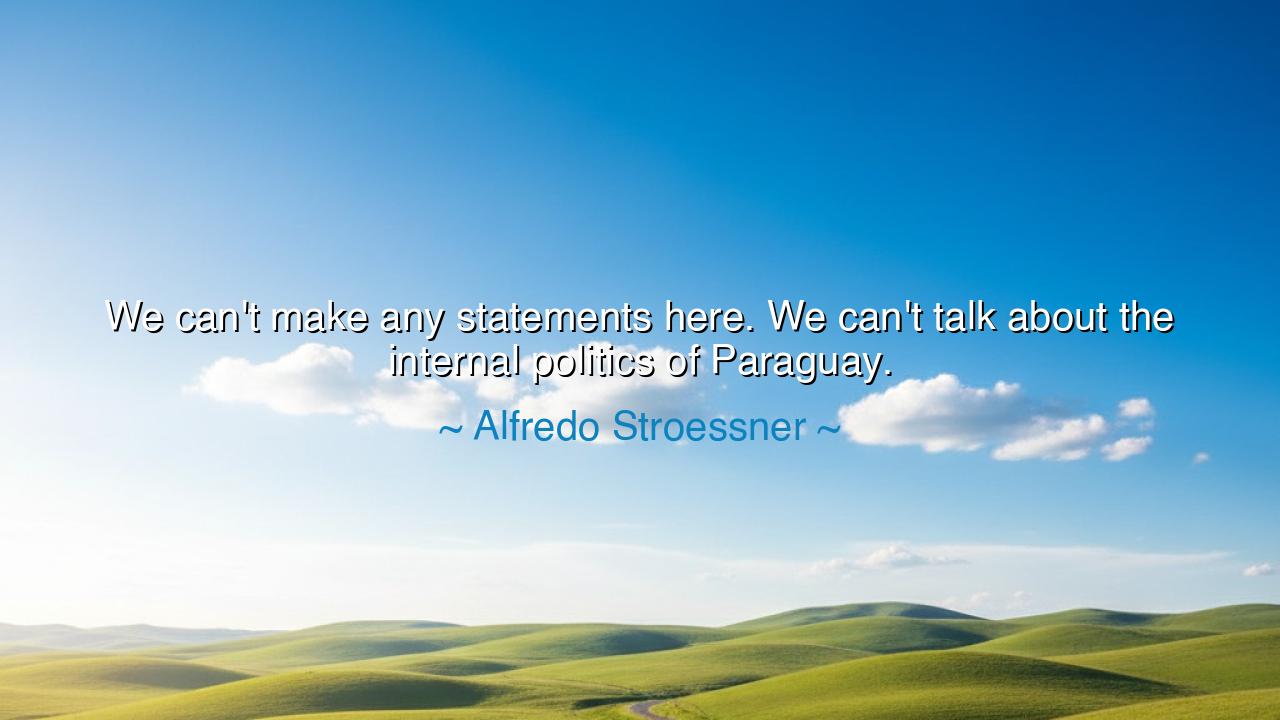
We can't make any statements here. We can't talk about the
We can't make any statements here. We can't talk about the internal politics of Paraguay.






The words of Alfredo Stroessner — “We can’t make any statements here. We can’t talk about the internal politics of Paraguay” — reveal not wisdom, but warning. Spoken by a ruler who cloaked his land in silence, these words expose the heavy veil that falls when fear rules over freedom. To forbid statements, to choke the tongue, is to sever the lifeblood of a people, for without speech, truth withers and the soul of a nation grows hollow.
In these words is the confession of tyranny. Stroessner, who reigned for decades through military might and secret police, understood well that to allow voices to rise would be to invite the winds of change. Thus, he commanded silence, forbidding talk of politics, for he feared the very hearts of his people. Like ancient kings who built walls to guard against revolt, he built an invisible fortress of censorship and terror. Yet history teaches us: no fortress of silence lasts forever.
Consider the tale of the Soviet Union, where for years citizens whispered in fear, unable to speak of their rulers without danger. Yet even in that iron silence, poets, dissidents, and ordinary workers carved hidden paths for truth. When the walls finally cracked, their voices, long restrained, rushed forth like a flood. Here lies the eternal lesson: though a tyrant may forbid statements, the yearning for freedom cannot be chained forever.
Stroessner’s words also remind us of the sacred duty of speech. To speak of justice, to question rulers, to debate the course of nations — these are not crimes, but the very breath of democracy. When people are denied this right, they become shadows in their own land. But when voices are allowed to rise, even kings must listen, and governments are made humble before the will of the people.
Let the generations remember: silence may be imposed, but truth always endures. The tyrant who forbids politics may rule for a season, but the people’s voice, though buried, will return like spring after the hardest winter. For words are stronger than walls, and no decree can forever smother the flame of freedom.






CHNguyen Cong Hai
Stroessner’s statement is incredibly telling, and it raises concerns about the suppression of political dialogue. Was this an attempt to keep control over both internal and external perceptions of Paraguay? Does avoiding discussion of internal politics shield the government from criticism or make it seem more out of touch with the people’s needs? In any political system, how important is it to have open dialogue between leaders and the people?
MPmanh pham
This quote seems to reflect the authoritarian nature of Stroessner’s regime, where openness about the country’s internal affairs was likely seen as a threat to the leadership. But when leaders shut down political discussions, what happens to accountability? Does this breed corruption or stagnation? I wonder how the people of Paraguay felt during his rule—were they able to push back, or was the culture of silence too ingrained in the system?
CDLe Nguyen Choi Do
Stroessner’s refusal to speak about Paraguay’s internal politics makes me curious about the political climate of the time. Was this kind of statement a way to prevent international interference, or was it a tactic to avoid scrutiny from his own people? I’m also wondering, how can a country move forward if its political leaders are unwilling to discuss internal issues? Isn’t transparency a fundamental part of governance?
LNLy Nguyen
It’s striking how Stroessner’s quote implies that discussing Paraguay’s internal politics is off-limits. In the context of his military dictatorship, does this reflect the power dynamics of a regime that suppresses public discourse? How does such an attitude affect the people’s ability to have a voice in their own government? Was this kind of silence a strategy to control the population, or a sign of fear of external or internal opposition?
NNhi
This quote from Stroessner is troubling in its lack of openness. It makes me wonder how much political discourse and freedom of speech were stifled under his regime. When a leader avoids talking about the internal politics of their own country, does it mean that they’re trying to hide something or simply prevent dissent? How can a nation grow if its leaders aren’t willing to engage in honest conversations about its politics?